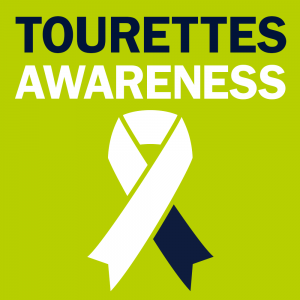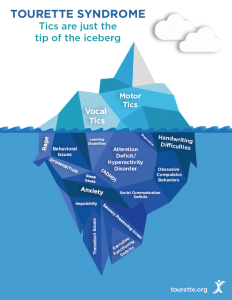You may or may not be aware that we have just had Tourettes Awareness Day on 7th June. You may have missed it as despite being a member of many Tourette’s support pages etc I barely noticed any publicity.
Tourettes Action have a “Move for Tourettes” campaign running throughout the month of June where they are asking you to set yourself a challenge to move more and raise money for Tourette’s (Link here)
There was also a campaign to change your profile picture to the Tourettes awareness ribbon or to take a #TSelfie of yourself winking to support Tourettes Awareness.
In comparison to Autism Awareness month in April, where you couldn’t fail to notice all the campaigns going on, it all felt a little flat.
In the run up to Tourettes Awareness Day, channel 4 screened a documentary about a family with two young son’s who have Tourettes Syndrome. Aside from it being yet another documentary that focuses on the extreme end of the scale and Coprolalia (involuntary and repetitive use of obscene language) the programme wasn’t too bad and showed the struggles people with Tourettes face. Unfortunately, following the episode airing social media was filled with people making the usual ignorant, ill informed judgemental comments. The message of awareness of Tourettes was completely lost amongst the tirade of abuse.
I wish the people making those comments would at least take the five minutes they spent writing and posting hurtful comments on researching instead. It is painfully clear we are still a long, long way from Tourettes being accepted and understood. I have even heard some advice given by Drs and Psychiatrists too that is completely inaccurate (thankfully not our own Drs).
I have never written a post with information about Tourettes as I assumed there was no need, like other conditions there is a plethora of similar posts out there. I have changed my mind as Tourettes Awareness Day brought anything but.
Here is my list of things you should know about Tourettes Syndrome.
- The diagnosis criteria is the presence of at least two motor tics and one vocal tic for at least 12 months. These tics can not be explained by any other condition. Tics should appear before age 18, happen multiple times a day with no longer than 3 months without tics.
- Vocal tics do not have to be words, they can be any sound at all. Common vocal tics are throat clearing, sniffing and whistling.
- There are simple motor tics such as rapid eye blinking, small facial movements, shrugging, wrinkling nose. There are also complex motor tics that appear more intentional and consist of a series of movements, for example touching or smelling people or objects, biting themselves, jumping or spinning.
- The most well known symptom of Tourettes is swearing (Coprolalia). This is generally due to the sensationalist way the media portrays Tourettes. In reality, less than 10% of people with Tourettes have this symptom.
- Tics wax and wane, over time and the tics themselves change. There will be periods when the tics are barely noticeable for some people and other times when they are extremely prominent. This is part of the condition. It does not mean the person makes up tics, changes tics deliberately or is cured.
- Tics can be suppressed for short periods of time, this does not mean the person can control their tics indefinitely. Suppressing tics is extremely exhausting, takes concentration away from other tasks and they can only be suppressed for a short time. As a result there is often an explosion of tics once they stop suppressing which can be extremely distressing.
- Obscene or personal comments do not mean that is what the person thinks or wants to say, in fact a tic will often come out because a person is desperately trying not to say something inappropriate. The brain misses out the “don’t say ***” it goes straight to the word trying to be suppressed and blurts it out.
- Laughing with someone about their tics is NOT the same as treating the whole condition as a joke. Many people with Tourettes don’t mind if you laugh at a funny tic but take offence if you joke about Tourettes in general. Using Tourettes as a joke not only means it is not taken seriously, it also continues to perpetuate inaccurate stereotypes that Tourettes Awareness is trying to move away from.
- Tourettes is a neurological condition, this means the person is born with it due to the way their brain developed. It is not caused by bad parenting or exposing children to bad language. Ignoring swearing tics is not encouraging your child to swear.
- Tourettes rarely comes alone. Many people with Tourettes also have another condition such as OCD, ADHD or Autism, or a combination of these.
- However deliberate a motor tic looks it is not done through choice. A vocal tic does not have to be random or sudden, a vocal tic can be said in context and sound intentional. Regardless of how a tic looks or sounds they are not deliberate and are just as distressing to the person with Tourettes.
- If you know someone with Tourettes that is one person. Like most neurological conditions there is a huge variation in the way and severity it manifests and no two people will experience it the same.




Thank you for this post. As a mother of a child with Tourette’s I appreciate this a great deal. Educating others is key.